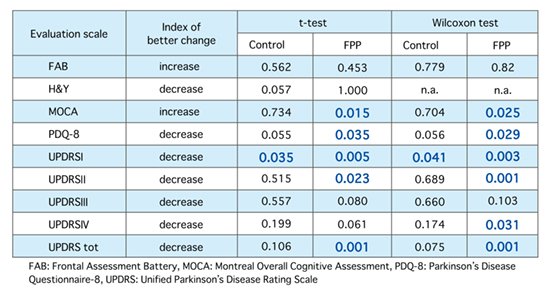Research
Effects of dietary supplementation with fermented papaya on oxidative stress, symptoms, and microbiome in Parkinson's disease
FILE2023
Effects of dietary supplementation with fermented papaya on oxidative stress, symptoms, and microbiome in Parkinson's disease
Functional Foods in Health and Disease, 13(4), 191-207. April 14, 2023.
Background: Oxidative stress, understood as the alteration of the physiological equilibrium between the production of oxygen and nitrogen free radicals and their metabolic neutralization (redox imbalance), is a typical condition of several pathologies, including neurodegenerative ones.
In Parkinson's disease (PD), oxidative phenomena typically interest the dopaminergic neurons of mesencephalic substantia nigra. Although it is unlikely that the redox imbalance represents the primary event of neurodegeneration, it is certain that it participates in cellular damage progression.
Objectives: Interventions to prevent or reduce the extent of the oxidative stress in PD and the consequent oxidative damage are of crucial importance. With this study, we have evaluated the effects of prolonged treatment with fermented papaya preparation (FPP) on redox imbalance, clinical parameters, and intestinal microbiome of PD patients.
Methods: Subjects were PD patients without fluctuations in stage 1-2 of the Hoehn-Yahr scale, under therapies with levodopa/carbidopa or levodopa/benderizine between 300 and 1200 mg/day. For six months, one group were treated with FPP (n=19, FPP) and another with placebo (n=20, Control); then, in the following six months, the treatments were exchanged. Several blood biochemical and hematological parameters were measured at the start and at the end of treatments. Among them are some components of antioxidant barriers, free radicals (total peroxides) and biomarkers of oxidative damage on DNA and proteins. To check the effects of FPP treatment on intestinal bacterial flora, we also evaluated the modification of microbiome with regards to the relative amounts of different phyla, families, genera, and species. Furthermore, accurate evaluations were performed on motor symptoms and cognitive functions of patients with validated survey scales to check the effects of FPP treatment on clinical parameters and quality life.
Results: Unlike the control group, the level of free radicals in the patients treated with FPP was not increased; the antioxidant barrier was strengthened and oxidative damages on proteins and especially on DNA were decreased. Even clinical features and quality life parameters of these patients have improved. Instead, the results of microbiome were inconclusive as changes resulted seemingly independent Ofelia the treatments.
Conclusions: The study demonstrates that FPP may be a valuable aid in counteracting oxidative stress and improve the motor symptoms and cognitive functions in PD. This effect does not seem to depend on increased growth of a particular bacterial phylum because the microbioma composition does not change significantly following the treatment; it cannot be excluded, however, that FPP works otherwise by modifying not the quantity but rather the metabolism of some specific bacterial group or that it has effects on the integrity of the intestinal mucosa.
Table . Statistical analysis of scores of survey scales recorded in control (C) and verum (V) subjects at the start and end of each treatment compared with both t-test and Wilcoxon test: the significant differences (p-values) are highlighted in bold.

